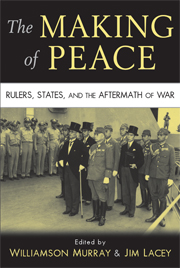Book contents
- Frontmatter
- Contents
- Preface: concluding peace
- 1 Introduction: searching for peace
- 2 The Peace of Nicias
- 3 “A swift and sure peace”: the Congress of Westphalia 1643–1648
- 4 The Peace of Paris, 1763
- 5 In search of military repose: the Congress of Vienna and the making of peace
- 6 War and peace in the post–Civil War South
- 7 Vae victoribus: Bismarck's quest for peace in the Franco-Prussian War, 1870–1871
- 8 Versailles: the peace without a chance
- 9 “Building buffers and filling vacuums”: Great Britain and the Middle East, 1914–1922
- 10 Mission improbable, fear, culture, and interest: peace making, 1943–1949
- 11 The economic making of peace
- 12 Ending the Cold War
- 13 Conclusion: history and the making of peace
- Index
- References
10 - Mission improbable, fear, culture, and interest: peace making, 1943–1949
Published online by Cambridge University Press: 05 June 2012
- Frontmatter
- Contents
- Preface: concluding peace
- 1 Introduction: searching for peace
- 2 The Peace of Nicias
- 3 “A swift and sure peace”: the Congress of Westphalia 1643–1648
- 4 The Peace of Paris, 1763
- 5 In search of military repose: the Congress of Vienna and the making of peace
- 6 War and peace in the post–Civil War South
- 7 Vae victoribus: Bismarck's quest for peace in the Franco-Prussian War, 1870–1871
- 8 Versailles: the peace without a chance
- 9 “Building buffers and filling vacuums”: Great Britain and the Middle East, 1914–1922
- 10 Mission improbable, fear, culture, and interest: peace making, 1943–1949
- 11 The economic making of peace
- 12 Ending the Cold War
- 13 Conclusion: history and the making of peace
- Index
- References
Summary
I have yet to see any problem, however complicated, which, when you looked at it the right way, did not become still more complicated.
Poul AndersonThis chapter argues that the Soviet–American Cold War was overdetermined. Since human agency, not impersonal forces, drive history, no event can be literally inevitable. But, some happenings, both great and small, are the product of so many factors pushing synergistically in the same direction that their occurrence is as close to a certainty as to make no difference. So it was with the Cold War. For the purposes of this chapter, the Cold War began with the proclamation of the Truman Doctrine on March 12, 1947, and ended with the destruction of the Berlin Wall on November 9, 1989.
With only mixed success, this analysis strives to distance itself from the rather tiresome and unproductive debate about the origins of the Cold War which has become a cottage industry for scholars. There is an obvious sense in which “peace making, 1943–1949” has to be about the origins, onset, and full emergence of what came to be termed the Cold War. But, this author wishes to follow strict navigational guidance intended to reveal the reasons why it was difficult to make peace out of, and after, the Second World War. Such a contextual perspective is more likely to reveal plausible insights than would yet another foray explicitly into the dark forest of Cold War studies.
- Type
- Chapter
- Information
- The Making of PeaceRulers, States, and the Aftermath of War, pp. 265 - 292Publisher: Cambridge University PressPrint publication year: 2008



